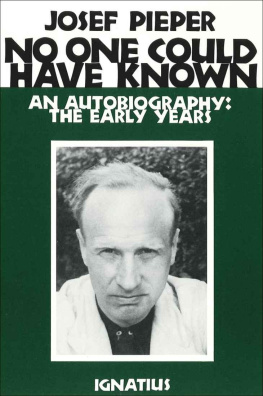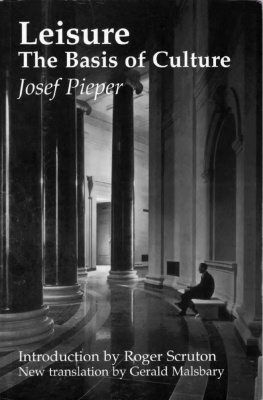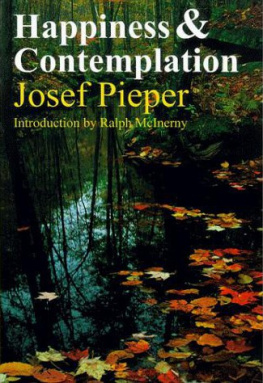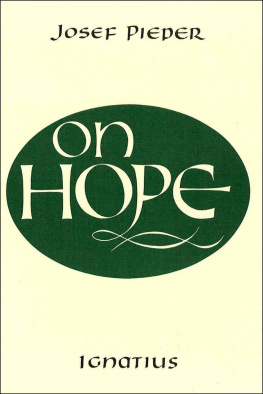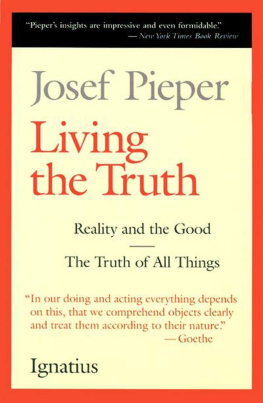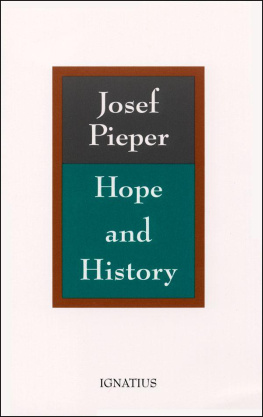Josef Pieper - No One Could Have Known: An Autobiography: The Early Years, 1904-1945
Here you can read online Josef Pieper - No One Could Have Known: An Autobiography: The Early Years, 1904-1945 full text of the book (entire story) in english for free. Download pdf and epub, get meaning, cover and reviews about this ebook. year: 1987, publisher: Ignatius Press, genre: Non-fiction. Description of the work, (preface) as well as reviews are available. Best literature library LitArk.com created for fans of good reading and offers a wide selection of genres:
Romance novel
Science fiction
Adventure
Detective
Science
History
Home and family
Prose
Art
Politics
Computer
Non-fiction
Religion
Business
Children
Humor
Choose a favorite category and find really read worthwhile books. Enjoy immersion in the world of imagination, feel the emotions of the characters or learn something new for yourself, make an fascinating discovery.
- Book:No One Could Have Known: An Autobiography: The Early Years, 1904-1945
- Author:
- Publisher:Ignatius Press
- Genre:
- Year:1987
- Rating:5 / 5
- Favourites:Add to favourites
- Your mark:
- 100
- 1
- 2
- 3
- 4
- 5
No One Could Have Known: An Autobiography: The Early Years, 1904-1945: summary, description and annotation
We offer to read an annotation, description, summary or preface (depends on what the author of the book "No One Could Have Known: An Autobiography: The Early Years, 1904-1945" wrote himself). If you haven't found the necessary information about the book — write in the comments, we will try to find it.
No One Could Have Known: An Autobiography: The Early Years, 1904-1945 — read online for free the complete book (whole text) full work
Below is the text of the book, divided by pages. System saving the place of the last page read, allows you to conveniently read the book "No One Could Have Known: An Autobiography: The Early Years, 1904-1945" online for free, without having to search again every time where you left off. Put a bookmark, and you can go to the page where you finished reading at any time.
Font size:
Interval:
Bookmark:
JOSEF PIEPER
Could Have Known
An Autobiography:
The Early Years
1904-1945
Translated by Graham Harrison
IGNATIUS PRESS SAN FRANCISCO
Title of the German original:
Noch wusste es niemand
Autobiographische Aufzeichnungen 1904-1945
1979 by Ksel-Verlag GmbH & Co., Munich
Photograph taken By Thomas Pieper (at age six)
Ignatius Press, San Francisco
All rights reserved
ISBN 978-0-89870-131-7
Library of Congress catalogue number 86-82509
Printed in the United States of America
And the end of all our exploring
Will be to arrive where we started
And know the place for the first time .
T. S. Eliot
At the beginning, before one has written so much as a line, there seems to be no end of material; it is as if one will never get to the end of the story. Indeed, there really is a great deal that may he worth reporting. But then, after a while, one experiences a strange thingor so it was in my case, at any rate.
This experience has two aspects, or rather, two stages. The first stage is when one suddenly knows that one will never manage to bring to light the real treasure for which one went down into the mine. While it becomes clearer all the time how every event in life has its particular hue, and above all its particular music, springing from its hidden source, that source is and remains beyond our reach. The door leading to that last room will not open. Memory cannot reach back that farexcept perhaps in dreams.
Gradually, however, one becomes aware of something else, of another limitation upon ones reporting and recounting. I do not mean the diffidence about speaking of private and intimate details of ones life and that of others. It would never occur to me, in any case, to pour out things of that kind. Few things are as detestable to me as the plebeian indiscretion of fashionable literature. No. What I am referring to is something quite different: again, it is that hidden root of life itself. Even if it could really be brought to the surface and given a name; even if, in the dense warp and woof of external happenings and personal action, of lifes gift-aspect and doom-aspect, one were to catch sight, for a split second, of the secret blueprint, the plan which we all sense lying behind everything; even if this could be seen and expressed, described in clear languageone would not utter so much as a word of it; of that we can be fairly certain. Thus, incidentally as it were, what one cannot do is found to be in league with what one is unwilling to do.
If it were otherwise, however, if there were not this central core, identified by silence, and giving shape to the whole, it would scarcely be worth attempting to give an account of ones life.
It was two years before the end of the last century, or, to be more precise, the end of February 1899. After a rather involved railway journey, a young teacher, who had come of age only three to four weeks earlier, finally took the ferryboat over the Ems and so arrived in the village of Elte, in the region of Mnister, in order to take up his first position.
He was fresh from the teachers training college in Bren. His baggage did not cause him much trouble. No doubt he had little more than a single suit and a few clothes in his traveling chest, but in all probability he did have the thirteen-volume edition of Schiller, printed around 1820, which today stands on my bookshelf. On the other hand I am not at all certain that he even had a coat.
One can surmise that, on the very day he arrived, he may have met the girl who, a few years later, was to become his wife and my mother. Indeed, it would not have been easy to ignore this prim village beauty, aged between fourteen and fifteen, who had just left school; and it just happened that she was the daughter of the widow who owned the inn where the new teacher regularly dined.
It is strange how the death of someone close to us enables us at a stroke to see that person in a completely new way, throughperhapsclearer and less inhibited eyes. Thus a few days after my mother died, at the age of eighty, I came across a photograph as if for the first time, showing her as a teenage girl with her nose in the air; one can well imagine that once in a while she let fly a sharp retort a little too hastily. It appears, however, that an unwonted shyness came over her with regard to the young stranger. Once, when he came into the house unexpectedly, she even crept into the durk , a cupboard-bunk built into the wall, where she and her sister used to sleep, because he always looked at her so peculiarly. At any rate that is the story I heard one of the maids tella story not intended for my boys ears. However, this resistance cannot have lasted very long. It transpired that my mother was not yet nineteen when the village schoolmaster took her to the Rhine (which neither of them had yet seen) on their honeymoon.
It cannot have been an easy task for my father, who for years was the only teacher in the village, to have got a foothold in this isolated little place, hidden among yellow sand dunes which still keep shifting strangely, even rising high into the branches of the birches and pines. It is not only that the people here think and speak more cautiously than elsewhere in Westphalia, but also that one needs to have got through a good bit more than the proverbial bushel of salt before one is accepted by them. Someone coming from the Paderborn area even has to begin to learn their language. For instance, they call a pike from the Ems a snook ; and for but they do not say aber but patt ; and to ask for the time the expression is Wu laat is et ? Naturally, that is how I spoke too; although we teachers children were supposed to speak nothing but High German, this was my first and mother tonguein a special sense in that it was literally the language of my mother and of her rural world. On the other hand, whenever my father spoke Low German to the farmers, or even to his wife, all his life he had a foreign accent.
Then, one day, 4 May 1904, I came into the world. Later on, my mother would tell again and again how, at that same hour of noon, there had been a tremendous spring thunderstorm. Perhaps at the time she secretly thought that it might be significant for the future of this first-born child. Not that she in any way spoiled me, however. In fact, life in the village and in our house was somewhat spartan and reserved. For instance, I cannot remember ever being kissed by my mother; it was simply not done.
On the other hand, early photographs of me in the family album show me looking almost like a crown prince. Barely twelve months old, I sit enthroned on a circular garden table against the background of the grotto which my fathers predecessor built in our garden out of semi-decayed tree stumps; mother sits next to me and holds me up, wearing her feast day finery and a high coiffure. On the other side is my father, his mustache with a slight Wilhelmine twirl, smoking the long pipe that reaches down to the floor. Even as a five-year-old, as later photographs show, my well-groomed blond hair reaches almost to my shoulders, and my Sunday suit is of dark velvet.
Naturally enough, the eldest child of the popular schoolmaster enjoyed a special public notice. Sunday saw me sitting on the organ stool next to my father. But I spent almost less of my day at home than at my grandparents farm, which lay on the main road, and I was also well known in their private bar.
For my grandmother did not remain a widow. She herself was the second wife of her husband, my mothers father, who fell suddenly to his death from the trapdoor of the loft. (My mother, who was eleven at the time, was hurriedly fetched from school to the dying man.) But after my grandmother had been a widow for five or six years, both the farm and the bar simply needed a man about the house. So she too married again, at the age of fifty. Her husband was a farmers son many years her junior; obviously he could not expect to have any children of his own; so it must have been a real stroke of providence for him unexpectedly to have in his household an intelligent child whom he could watch growing up, a child who called him grandfatherwhile he was barely thirty-five. And of course it was providential for me as well.
Next pageFont size:
Interval:
Bookmark:
Similar books «No One Could Have Known: An Autobiography: The Early Years, 1904-1945»
Look at similar books to No One Could Have Known: An Autobiography: The Early Years, 1904-1945. We have selected literature similar in name and meaning in the hope of providing readers with more options to find new, interesting, not yet read works.
Discussion, reviews of the book No One Could Have Known: An Autobiography: The Early Years, 1904-1945 and just readers' own opinions. Leave your comments, write what you think about the work, its meaning or the main characters. Specify what exactly you liked and what you didn't like, and why you think so.

